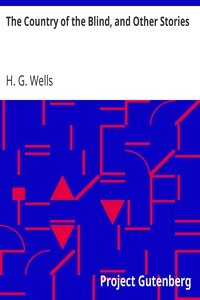The Country of the Blind, and Other Stories, H. G. Wells [top 10 books of all time TXT] 📗

- Author: H. G. Wells
Book online «The Country of the Blind, and Other Stories, H. G. Wells [top 10 books of all time TXT] 📗». Author H. G. Wells
THE COUNTRY OF THE BLIND AND OTHER STORIES By H. G. Wells
CONTENTS
INTRODUCTION
I. — THE JILTING OF JANE.
II. — THE CONE.
III. — THE STOLEN BACILLUS.
IV. — THE FLOWERING OF THE STRANGE ORCHID.
V. — IN THE AVU OBSERVATORY.
VI. — AEPYORNIS ISLAND.
VII. — THE REMARKABLE CASE OF DAVIDSON'S EYES.
VIII. — THE LORD OF THE DYNAMOS.
IX. — THE MOTH.
X. — THE TREASURE IN THE FOREST.
XI. — THE STORY OF THE LATE MR. ELVESHAM.
XII. — UNDER THE KNIFE.
XIII. — THE SEA RAIDERS.
XIV. — THE OBLITERATED MAN.
XV. — THE PLATTNER STORY.
XVI. — THE RED ROOM.
XVII. — THE PURPLE PILEUS
XVIII. — A SLIP UNDER THE MICROSCOPE.
XIX. — THE CRYSTAL EGG.
XX. — THE STAR.
XXI. — THE MAN WHO COULD WORK MIRACLES.
XXII. — A VISION OF JUDGMENT.
XXIII. — JIMMY GOGGLES THE GOD.
XXIV. — MISS WINCHELSEA'S HEART.
XXV. — A DREAM OF ARMAGEDDON.
XXVI. — THE VALLEY OF SPIDERS.
XXVII. — THE NEW ACCELERATOR.
XXVIII. — THE TRUTH ABOUT PYECRAFT.
XXIX. — THE MAGIC SHOP.
XXX. — THE EMPIRE OF THE ANTS.
XXXI. — THE DOOR IN THE WALL.
XXXII. — THE COUNTRY OF THE BLIND.
XXXIII. — THE BEAUTIFUL SUIT.
INTRODUCTION
The enterprise of Messrs. T. Nelson & Sons and the friendly accommodation of Messrs. Macmillan render possible this collection in one cover of all the short stories by me that I care for any one to read again. Except for the two series of linked incidents that make up the bulk of the book called Tales of Space and Time, no short story of mine of the slightest merit is excluded from this volume. Many of very questionable merit find a place; it is an inclusive and not an exclusive gathering. And the task of selection and revision brings home to me with something of the effect of discovery that I was once an industrious writer of short stories, and that I am no longer anything of the kind. I have not written one now for quite a long time, and in the past five or six years I have made scarcely one a year. The bulk of the fifty or sixty tales from which this present three-and-thirty have been chosen dates from the last century. This edition is more definitive than I supposed when first I arranged for it. In the presence of so conclusive an ebb and cessation an almost obituary manner seems justifiable.
I find it a little difficult to disentangle the causes that have restricted the flow of these inventions. It has happened, I remark, to others as well as to myself, and in spite of the kindliest encouragement to continue from editors and readers. There was a time when life bubbled with short stories; they were always coming to the surface of my mind, and it is no deliberate change of will that has thus restricted my production. It is rather, I think, a diversion of attention to more sustained and more exacting forms. It was my friend Mr. C.L. Hind who set that spring going. He urged me to write short stories for the Pall Mall Budget, and persuaded me by his simple and buoyant conviction that I could do what he desired. There existed at the time only the little sketch, "The Jilting of Jane," included in this volume—at least, that is the only tolerable fragment of fiction I find surviving from my pre-Lewis-Hind period. But I set myself, so encouraged, to the experiment of inventing moving and interesting things that could be given vividly in the little space of eight or ten such pages as this, and for a time I found it a very entertaining pursuit indeed. Mr. Hind's indicating finger had shown me an amusing possibility of the mind. I found that, taking almost anything as a starting-point and letting my thoughts play about it, there would presently come out of the darkness, in a manner quite inexplicable, some absurd or vivid little incident more or less relevant to that initial nucleus. Little men in canoes upon sunlit oceans would come floating out of nothingness, incubating the eggs of prehistoric monsters unawares; violent conflicts would break out amidst the flower-beds of suburban gardens; I would discover I was peering into remote and mysterious worlds ruled by an order logical indeed but other than our common sanity.
The 'nineties was a good and stimulating period for a short-story writer. Mr. Kipling had made his astonishing advent with a series of little blue-grey books, whose covers opened like window-shutters to reveal the dusty sun-glare and blazing colours of the East; Mr. Barrie had demonstrated what could be done in a little space through the panes of his Window in Thrums. The National Observer was at the climax of its career of heroic insistence upon lyrical brevity and a vivid finish, and Mr. Frank Harris was not only printing good short stories by other people, but writing still better ones himself in the dignified pages of the Fortnightly Review. Longman's Magazine, too, represented a clienthle of appreciative short-story readers that is now scattered. Then came the generous opportunities of the Yellow Book, and the National Observer died only to give birth to the New Review. No short story of the slightest distinction went for long unrecognised. The sixpenny popular magazines had still to deaden down the conception of what a short story might be to the imaginative limitation





Comments (0)